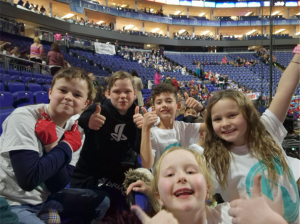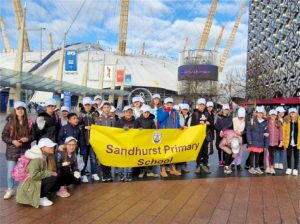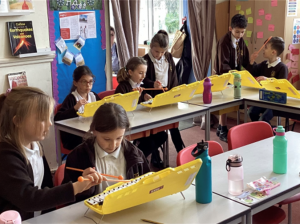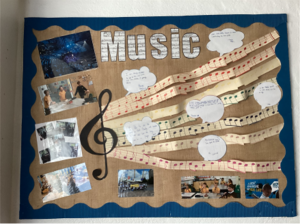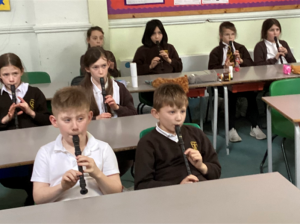
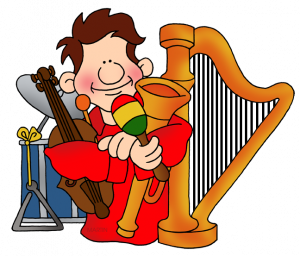
Music teaching at Sandhurst Primary School aims to follow the specifications of the National Curriculum; providing a broad, balanced and differentiated curriculum and ensuring the progressive development of musical concepts, knowledge and skills. At Sandhurst we believe that enjoyment of music plays an integral role in helping children to feel part of a community, therefore we provide opportunities for all children to create, play, perform and enjoy music both in class and to an audience. Through assemblies and key stage performances, children aim high to demonstrate their talent and their understanding of performing with awareness of others. They are also able to show their kindness to others by sharing their musical talents with the local community.
Lessons enable children to challenge and develop their skills, appreciate a wide variety of music and begin to appraise a range of musical genres.
The aims of our Music curriculum are to develop pupils who:
- Enjoy and have an appreciation for music.
- Listen to, review and evaluate music across a range of historical periods, genres, cultures, styles and traditions.
- Can sing and use their voices to create different effects.
- Create and compose music, both on their own and with others.
- Use a range of musical language.
- Make judgements and express personal preferences about the quality and style of music.
- Take part in performances with an awareness of audience.
All children have access to music regardless of their academic ability, race, ethnicity, background and language. SEND pupils are actively encouraged to participate fully as music is often an area of the curriculum which allows them to excel. We aim to provide children with the opportunity to progress to the next level of their creative excellence.
We are also proud to be recognised as a Music Mark school for our commitment to providing high quality music lessons throughout the school.
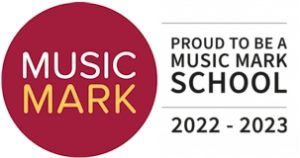
Music in the EYFS
Within the EYFS setting, music is an integral part of children’s learning journey. Rhyme and rhythm are utilised throughout the learning of phonics, handwriting and mathematics. Children learn a wide range of songs and rhymes and develop skills for performing together. Singing and music making opportunities are used frequently to embed learning, develop musical awareness and to demonstrate how music can be used to express feelings.
Implementation in KS1 and KS2
Music teaching at Sandhurst Primary School delivers the requirements of the National Curriculum through use of the Charanga scheme of work. Teachers follow the suggested scheme of work, although adaptations can be made using the ‘freestyle’ element of the package to substitute units deemed to be more appropriate for thematic learning in other curriculum areas. Music lessons are broken down into half-termly units and an emphasis is placed on musical vocabulary, allowing children to talk about pieces of music using the correct terminology.
See the table below for termly units.
| Autumn 1 | Autumn 2 | Spring 1 | Spring 2 | Summer 1 | Summer 2 | |
| Year 1 | Hey you! | Rhythm in the Way we Walk and Banana Rap | In the Groove | Round and Round | Your Imagination | Reflect, Rewind and Replay |
| Year 2 | Hands, Feet, Heart | Ho, Ho, Ho | I Wanna Play in a Band | Zoo Time | Friendship Song | Reflect, Rewind and Replay |
| Year 3 | Let your Spirit Fly | Glockenspiel 1 | Three Little Birds | The Dragon Song | Bringing us Together | Reflect, Rewind and Replay |
| Year 4 | Mama Mia | Glockenspiel 2 | Stop! | Lean on me | Blackbird | Reflect, Rewind and Replay |
| Year 5 | Livin’ on a Prayer | Classroom Jazz 1 | Make you Feel my Love | The Fresh Prince of Bel Air | Dancing in the Street | Reflect, Rewind and Replay |
| Year 6 | Happy | Classroom Jazz 2 | A New Year Carol | You’ve got a Friend | Music and me | Reflect, Rewind and Replay |
Performance is also an important part of musical teaching and learning at Sandhurst and pupils participate in a range of performances during their school ‘career’. These include nativities (KS1 and KS2), Easter performances (Years R-6) and a Leavers performance (Year 6). Pupils also take part in Harvest assemblies, class assemblies (Years R-6) and singing assemblies. Alongside our curriculum provision for music, pupils also have the opportunity to participate in additional Rock Steady music lessons and have individual piano lessons. Every year our choir takes part in the Young Voices concert at the 02 (Years 3 -6). From September 2024, a woodwind lessons will also be on offer.
Each unit of work has an on-going musical learning focus and lessons usually follow a specific learning sequence:
- Listen and Appraise
- Musical Activities (including pulse and rhythm)
- Singing and Voice
- Playing instruments · Improvisation / Composition
- Perform and Share
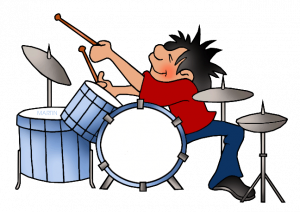
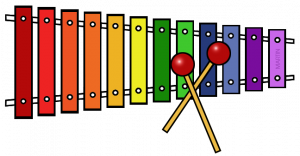 Throughout their journey at Sandhurst, children’s musical skills and understanding are built year on year, from singing nursery rhymes and action songs from memory and performing simple rhythm patterns on tuned and untuned percussion instruments in Early Years, progressing their skills and understanding in KS1 where they also experience whole class instrumental tuition on the recorder or glockenspiel, to further developing their skills and knowledge of the subject in lower KS2, where the children access music confidently, and have the ability to read and follow a simple musical or graphical score. Throughout all of this the child’s enjoyment of music is a key element, running alongside the ‘taught’ musical skills and objectives.
Throughout their journey at Sandhurst, children’s musical skills and understanding are built year on year, from singing nursery rhymes and action songs from memory and performing simple rhythm patterns on tuned and untuned percussion instruments in Early Years, progressing their skills and understanding in KS1 where they also experience whole class instrumental tuition on the recorder or glockenspiel, to further developing their skills and knowledge of the subject in lower KS2, where the children access music confidently, and have the ability to read and follow a simple musical or graphical score. Throughout all of this the child’s enjoyment of music is a key element, running alongside the ‘taught’ musical skills and objectives.
We want our pupils to develop a love for music and as a result remind them, if they continue to aim high, as a responsible citizen, they could become:
- Theatre performer
- Audio designer
- Casting director
- Performer
- Song writer
We measure the impact of our curriculum through the following methods:
- Use of the assessment tools provided within the Charanga scheme.
- Pupil discussions and interviewing the pupils about their learning (pupil voice).
- Photo and video evidence of the pupils practical learning.
Aspirations for the future
We want our pupils to develop a love for music and as a result remind them, if they continue to aim high, as a responsible citizen, they could become a Theatre performer, Audio designer, Casting director, Performer or Song writer

Our music curriculum is based on the Charanga world-leading music teaching and learning platform.
Charanga is a music education and technology company based in Brighton in the UK. They hve developed an online platform that provides teachers and students with the help and resources they need to achieve their musical ambitions.
They, like us believe that everyone who uses the Charanga platform should enjoy every minute of their music education. We are both passionate about children’s music learning and its potential to help them grow up as kind, curious, and open-minded young people, who are sensitive and knowledgeable about music and the arts.
"We know that we can transform music teaching and learning by combining world-class educational technology, solid pedagogy, and great resources. This is what has driven Charanga from its very beginnings."
Find out more by visiting their website : https://charanga.com/site/musical-school/
Knowledge & Skills – Year 1
| Supporting Songs and Styles | |||||
| 1 | 2 | 3 | 4 | 5 | 6 |
| Hey You! By Joanna Mangona | Rhythm In The Way We Walk and The Banana Rap by Joanna Mangona and Jane Sebba | In The Groove by Joanna Mangona | Round and Round by Joanna Mangona | Your Imagination by Joanna Mangona and Pete Readman | Reflect, Rewind and Replay |
| Old-School Hip-Hop | Reggae | Blues, Baroque, Latin, Bhangra, Folk, Funk | Bossa Nova | Pop | Classical |
| Me, Myself And I by De La Soul
Fresh Prince Of Bel-Air by Will Smith Rapper’s Delight by The Sugarhill Gang U Can’t Touch This by MC Hammer It’s Like That by Run DMC |
The Planets, Mars by Gustav Holst (Classical)
Tubular Bells by Mike Oldfield (Pop) The Banana Rap by Jane Sebba (Hip Hop) Happy by Pharrell Williams (Pop) When I’m 64 by The Beatles (Pop) |
How Blue Can You Get by B.B. King (Blues)
Let The Bright Seraphim by Handel (Baroque) Livin’ La Vida Loca by Ricky Martin (Latin/Pop) Jai Ho by J.R. Rahman (Bhangra/Bollywood) Lord Of The Dance by Ronan Hardiman (Irish) Diggin’ On James Brown by Tower Of Power (Funk) |
Livin’ La Vida Loca by Ricky Martin (Latin/Pop)
Imperial War March by John Williams (Film) It Had Better Be Tonight by Michael Bublé (Latin/Big Band) Why Don’t You by Gramophonedzie (Big Band/Dance) Oya Como Va by Santana (Latin/Jazz) |
Supercalifragilisticexpialid ocious from Mary Poppins
Pure Imagination from Willy Wonka & The Chocolate Factory soundtrack Daydream Believer by The Monkees Rainbow Connection from The Muppet Movie A Whole New World from Aladdin |
A Song Before Sunrise by Frederick Delius – 20th Century
The Firebird by Igor Stravinsky – 20th Century The Bird by Sergei Prokofiev – 20th Century Grand March from Aida by Giuseppe Verdi – Classical Bolero by Maurice Ravel – 20th Century The Lamb by John Tavener – Contemporary |
| Listen and Appraise | |
| Knowledge | Skills |
|
|
| Games | |
| Knowledge | Skills |
|
There are progressive Warm-up Games and Challenges within each Unit that embed pulse, rhythm and pitch. Children will complete the following in relation to the main song:
|
| Singing | |
| Knowledge | Skills |
|
|
| Playing | |
| Knowledge | Skills |
|
|
| Improvisation | |
| Knowledge | Skills |
|
Use the improvisation tracks provided. Improvise using the three challenges:
|
| Composition | |
| Knowledge | Skills |
|
|
| Performance | |
| Knowledge | Skills |
|
|
Knowledge & Skills – Year 2
| Supporting Songs and Styles | |||||
| 1 | 2 | 3 | 4 | 5 | 6 |
| Hands, Feet, Heart by Joanna Mangona | Ho, Ho, Ho by Joanna Mangona | I Wanna Play in a Band by Joanna Mangona | Zootime by Joanna Mangona | Friendship Song by Joanna Mangona and Pete Readman | Reflect, Rewind and Replay |
| Afropop, South African | A song with rapping and improvising for Christmas | Rock | Reggae | Pop | Classical |
| The Click Song sung by Miriam Makeba
The Lion Sleeps Tonight sung by Soweto Gospel Choir Bring Him Back by Hugh Masekela You Can Call Me Al by Paul Simon Hlokoloza by Arthur Mafokate |
Bring Him Back Home (Nelson Mandela) by Hugh Masekela (Freedom Song)
Suspicious Minds by Elvis Presley (Pop) Sir Duke by Stevie Wonder (Funk) Fly Me To The Moon by Frank Sinatra (Big Band/Jazz) |
We Will Rock You by Queen
Smoke On The Water by Deep Purple Rockin’ All Over The World by Status Quo Johnny B.Goode by Chuck Berry I Saw Her Standing There by The Beatles |
Kingston Town by UB40
Shine by ASWAD IGY by Donald Fagen Feel Like Jumping by Marcia Griffiths I Can See Clearly Now by Jimmy Cliff |
Count On Me by Bruno Mars
We Go Together (from the Grease soundtrack) You Give A Little Love (from Bugsy Malone) That's What Friends Are For by Gladys Knight, Stevie Wonder, Dionne Warwick with Elton John You've Got A Friend In Me by Randy Newman |
Peer Gynt Suite: Anitras
Dance by Edvard Grieg - Romantic Brandenburg Concerto No 1 by Johann Sebastian Bach - Baroque From The Diary Of A Fly by Béla Bartók - 20th Century Fantasia On Greensleeves by Ralph Vaughn Williams - 20th century Dance of The Sugar Plum Fairy by Pytor Tchaikovsky - Romantic The Robots (Die Roboter) by Kraftwerk - Contemporary |
| Listen and Appraise | |
|
|
| Games | |
| Knowledge | Skills |
|
There are progressive Warm-up Games and Challenges within each Unit that embed pulse, rhythm and pitch. Children will complete the following in relation to the main song:
|
| Singing | |
| Knowledge | Skills |
|
|
| Playing | |
| Knowledge | Skills |
|
|
| Improvisation | |
| Knowledge | Skills |
|
Use the improvisation tracks provided. Improvise using the three challenges:
|
| Composition | |
| Knowledge | Skills |
|
|
| Performance | |
| Knowledge | Skills |
|
|
Knowledge & Skills – Year 3
| Supporting Songs and Styles | |||||
| 1 | 2 | 3 | 4 | 5 | 6 |
| Let Your Spirit Fly by Joanna Mangona | Glockenspiel Stage 1 | Three Little Birds by Bob Marley | The Dragon Song by Joanna Mangona and Pete Readman | Bringing Us Together byJoanna Mangona andPete Readman | Reflect, Rewind and Replay |
| RnB | Mixed styles | Reggae | A Pop song that tells a story | Disco | Classical |
| Colonel Bogey March by Kenneth Alford (Film)Consider Yourself from the musical ‘Oliver!’ (Musicals)
Ain’t No Mountain High Enough by Marvin Gaye (Motown) You’re The First, The Last, My Everything by Barry White (Soul) |
Easy E
Strictly D Drive D-E-F-initely Roundabout March of the Golden Guards Portsmouth |
Jamming by Bob Marley
Small People by Ziggy Marley 54-56 Was My Number by Toots and The Maytals Ram Goat Liver by Pluto Shervington Our Day Will Come by Amy Winehouse |
Birdsong - Chinese Folk Music
Vaishnava Java - A Hindu Song A Turkish Traditional Tune Aitutaki Drum Dance from Polynesia Zebaidir Song from Sudan |
Good Times by Nile Rodgers
Ain’t Nobody by Chaka Khan We Are Family by Sister Sledge Ain’t No Stopping Us Now by McFadden and Whitehead Car Wash by Rose Royce |
L’Homme Arme by Robert Morton - Early Music
Les Tricoteuses (The Knitters) - Baroque The Clock: II Andante by Franz Joseph Haydn - Classical Piano Concerto: Allegro Maestoso (Tempo Guisto) by Franz Liszt - Romantic Prelude A L’Apres-Midi d’un Faune by Claude Debussy - 20th century Music for Large and Small Ensembles (opening) by Kenny Wheeler - Contemporary |
| Listen and Appraise | |
| Knowledge | Skills |
|
|
| Musical Activities: Games | |
| Knowledge | Skills |
|
Using the Warm up Games tracks provided, complete the Bronze, Silver and Gold Challenges. Children will complete the following in relation to the main song, using two notes:
|
| Musical Activities: Singing | |
| Knowledge | Skills |
|
To know and be able to talk about:
|
|
| Musical Activities: Playing Instruments | |
| Knowledge | Skills |
To know and be able to talk about:
|
|
| Musical Activities: Improvisation | |
| Knowledge | Skills |
To know and be able to talk about improvisation:
|
Improvise using instruments in the context of the song they are learning to perform. Using the improvisation tracks provided, children will complete the Bronze, Silver or Gold Challenges:
|
| Musical Activities: Composition | |
| Knowledge | Skills |
To know and be able to talk about:
|
|
| Performance | |
| Knowledge | Skills |
To know and be able to talk about:
|
|
Knowledge & Skills – Year 4
| Supporting Songs and Styles | |||||
| 1 | 2 | 3 | 4 | 5 | 6 |
| Mamma Mia by ABBA | Glockenspiel Stage 2 | Stop! by Joanna Mangona | Lean On Me sung by Bill Withers | Blackbird by The Beatles | Reflect, Rewind & Replay |
| Pop | Mixed styles | Grime and mixed styles | Gospel | Pop/The Beatles | Classical |
| ABBA’s music:
Dancing Queen by ABBA The Winner Takes It All by ABBA Waterloo by ABBA Super Trouper by ABBA Thank You For The Music by ABBA |
Mardi Gras Groovin’
Two-Way Radio Flea, Fly, Mosquito Rigadoon Mamma Mia Portsmouth Strictly D Play Your Music Drive |
Gotta Be Me performed by Secret Agent 23 Skidoo (Hip Hop)
Radetzky Marsch by Strauss (Classical) Can’t Stop The Feeling! by Justin Timberlake (Pop) Libertango by Astor Piazzolla (Tango) Mas Que Nada performed by Sérgio Mendes featuring Black Eyed Peas |
He Still Loves Me by Walter Williams and Beyoncé (Gospel)
Shackles (Praise You) by Mary Mary (Gospel) Amazing Grace by Elvis Presley (Gospel) Ode To Joy Symphony No 9 by Beethoven (Romantic – Western Classical) Lean On Me by The ACM Gospel Choir (Gospel) |
Yellow Submarine by The Beatles
Hey Jude by The Beatles Can’t Buy Me Love by The Beatles Yesterday by The Beatles Let It Be by The Beatles |
La Quinta Estampie Real anon 13th century (Early Music)
The Arrival Of The Queen Of Sheba by Handel (Baroque) Moonlight Sonata by Beethoven (Romantic) Bridal Chorus (Wedding March) by Wagner (Romantic) Rhapsody In Blue by Gershwin (20th Century) Einstein On The Beach by Philip Glass (Contemporary) |
| Listen and Appraise | |
| Knowledge | Skills |
|
|
| Games | |
| Knowledge | Skills |
Know and be able to talk about:
|
Using the Warm up Games tracks provided, complete the Bronze, Silver and Gold Challenges. Children will complete the following in relation to the main song, using two notes:
|
| Singing | |
| Knowledge | Skills |
To know and be able to talk about:
|
|
| Playing | |
| Knowledge | Skills |
To know and be able to talk about:
|
|
| Improvisation | |
| Knowledge | Skills |
To know and be able to talk about improvisation:
|
Improvise using instruments in the context of a song they are learning to perform. Use the improvisation tracks provided and improvise using the Bronze, Silver or Gold Challenges.
|
| Composition | |
| Knowledge | Skills |
|
|
| Performance | |
| Knowledge | Skills |
To know and be able to talk about:
|
|
Knowledge & Skills – Year 5
| Supporting Songs and Styles | |||||
| 1 | 2 | 3 | 4 | 5 | 6 |
| Livin’ on a Prayer by Bon Jovi | Classroom Jazz by Ian Gray | To Make You Feel My Love sung by Adele | Fresh Prince of Bel-Air rapped by Will Smith | Dancing in the Street sung by Martha and The Vandellas | Reflect, Rewind & Replay |
| Rock | Bossa Nova and Swing | Pop Ballads | Old-School Hip-Hop | Motown | Classical |
| We Will Rock You by Queen
Smoke On The Water by Deep Purple Rockin’ All Over The World by Status Quo Johnny B.Goode by Chuck Berry I Saw Her Standing There by The Beatles |
Desafinado by Stan Getz (Swing)
Cotton Tail by Ben Webster 5 Note Swing by Ian Gray Perdido by Woody Herman |
Make You Feel My Love by Bob Dylan
So Amazing by Luther Vandross Hello by Lionel Ritchie The Way You Look Tonight by Tony Bennett |
Me Myself and I by De La Soul
Ready or Not by Fugees Rapper’s Delight by The Sugarhill Gang U Can’t Touch This by M C Hammer |
I can’t Help Myself (Sugar Pie Honey Bunch) by The Four Tops
I Heard it Through the Grapevine by Marvin Gaye Ain’t No Mountain High Enough sung by Marvin Gaye and Tammi Terrell You Are the Sunshine of My Life by Stevie Wonder |
Music from Compline – Traditional – Early Music
Dido and Aeneas: Overture by Henry Purcell – Baroque Symphony No. 5 in C minor (allegro con brio) by Ludwig Van Beethoven – Classical Minute Waltz in D-flat by Chopin – Romantic Central Park in the Dark by Charles Edward Ives – 20th Century Clapping Music by Steve Reich– Contemporary |
| Listen and Appraise | |
| Knowledge | Skills |
|
|
| Games | |
| Knowledge | Skills |
Know and be able to talk about:
|
Using the Warm up Games tracks provided, complete the Bronze, Silver and Gold Challenges. Children will complete the following in relation to the main song, using three notes:
|
| Singing | |
| Knowledge | Skills |
|
|
| Playing | |
| Knowledge | Skills |
To know and be able to talk about:
|
|
| Improvisation | |
| Knowledge | Skills |
To know and be able to talk about improvisation:
|
Improvise using instruments in the context of a song to be performed. Use the improvisation tracks provided and improvise using the Bronze, Silver or Gold Challenges.
Bronze – Copy back using instruments. Use one note. Silver – Copy back using instruments. Use the two notes. Gold – Copy back using instruments. Use the three notes.
Bronze – Question and Answer using instruments. Use one note in your answer. Silver – Question and Answer using instruments. Use two notes in your answer. Always start on a G. Gold – Question and Answer using instruments. Use three notes in your answer. Always start on a G.
Bronze – Improvise using one note. Silver – Improvise using two notes. Gold – Improvise using three notes. Classroom Jazz 2 – Improvise with a feeling for the style of Bossa Nova and Swing using the notes D, E, G, A + B (pentatonic scale/a five-note pattern) |
| Composition | |
| Knowledge | Skills |
To know and be able to talk about:
|
|
| Performance | |
| Knowledge | Skills |
To know and be able to talk about:
|
|
Knowledge & Skills – Year 6
| Unit | 1 | 2 | 3 | 4 | 5 | 6 |
| Improvisation | ||||||
| Bronze Challenge 1 | Play and Copy back Copy back using instruments. Use 1 note: A | Bacharach Anorak C, D, E, F, G, A, B + C
Meet the Blues C, Bb, G, F + C |
n/a | Play and Copy back Copy back using instruments. Use 1 note: A | n/a | Revise existing |
| Bronze Challenge 2 | Play and Improvise
Question and Answer using instruments. Use 1 note in your answer: A |
Play and Improvise Question and Answer using instruments. Use 1 note in your answer: A | n/a | |||
| Bronze Challenge 3 | Improvise!
Take it in turns to improvise using 1 note: A |
Improvise!
Take it in turns to improvise using 1 note: A |
n/a | |||
| Silver Challenge 1 | Play and Copy back
Copy back using instruments. Use 2 notes: A and G |
Play and Copy back Copy back using instruments. Use 2 notes: A and G | n/a | |||
| Silver Challenge 2 | Play and Improvise
Question and Answer using instruments. Use 2 notes in your answer: A and G |
Play and Improvise Question and Answer using instruments. Use 2 notes in your answer: A and G | n/a | |||
| Silver Challenge 3 | Improvise!
Take it in turns to improvise using 2 notes: A and G |
Improvise!
Take it in turns to improvise using 2 notes: D and E |
n/a | |||
| Gold Challenge 1 | Play and Copy back
Copy back using instruments. Use 3 notes: A, G and B |
Play and Copy back Copy back using instruments. Use 3 notes: A, G and E | n/a | |||
| Gold Challenge 2 | Play and Improvise
Question and Answer using instruments. Use 3 notes in your answer: A, G and B |
Play and Improvise Question and Answer using instruments. Use 3 notes in your answer: A, G and E | n/a | |||
| Gold Challenge 3 | Improvise!
Take it in turns to improvise using 3 notes: A, G and B |
Improvise!
Take it in turns to improvise using 3 notes: A, G and E |
n/a | |||
| Unit | 1 | 2 | 3 | 4 | 5 | 6 |
| Composing | ||||||
| Starting notes | A | n/a | n/a | E | n/a | Revise existing |
| Easy option | A, G + B | n/a | n/a | E, G + A | n/a | |
| Harder option | C, E, G, A + B | n/a | n/a | E, G, A, C + D | n/a | |
| Supporting Songs and Styles | |||||
| 1 | 2 | 3 | 4 | 5 | 6 |
| Happy | Classroom Jazz 2 | A New Year Carol | You’ve Got A Friend | Music and Me | Reflect, Rewind & Replay |
| Pop/Neo Soul | Bacharach and Blues | Classical or Urban Gospel | 70s Ballad/Pop | Hip Hop, Classical, Electronic, Soul, Contemporary | Classical |
| Top Of The World sung by The Carpenters
Don’t Worry, Be Happy sung by Bobby McFerrin Walking On Sunshine sung by Katrina And The Waves When You’re Smiling sung by Frank Sinatra Love Will Save The Day sung by Brendan Reilly |
Take The ‘A’ Train by Duke Ellington
Speaking My Peace by H. Parlan Back ‘O’Town Blues by Earl Hines One ‘O’ Clock Jump by Count Basie |
I Mun Be Married on Sunday
Fishing Song |
The Loco-Motion sung by Little Eva
One Fine Day sung by The Chiffons Up On The Roof sung by The Drifters Will You Still Love Me Tomorrow (You Make Me Feel Like) A Natural Woman sung by Carole King |
Something Helpful by Anna Meredith
O by Shiva Feshareki V-A-C Moscow by Shiva Feshareki Heroes & Villains by Eska Shades Of Blue by Eska And! by Afrodeutsche The Middle Middle by Afrodeutsche |
L'autrier Pastoure Seoit (The Other Day a Shepherdess Was Sitting) – Traditional – Early Music
Armide Overture by Jean-Baptiste Lully – Baroque The Marriage of Figaro: Overture by Mozart – Classical Erlkönig, D.328 Op. 1 Wer reitet so spät by Franz Schubert – Romantic Sonata for Horn in F by Paul Hindemith – 20th century Homelands by Nitin Sawhney – Contemporary |
| Listen and Appraise | |
| Knowledge | Skills |
|
|
| Games | |
| Knowledge | Skills |
Know and be able to talk about:
|
Using the Warm up Games tracks provided, complete the Bronze, Silver and Gold Challenges. Children will complete the following in relation to the main song, using three notes:
|
| Singing | |
| Knowledge | Skills |
|
|
| Playing | |
| Knowledge | Skills |
To know and be able to talk about:
|
|
| Improvisation | |
| Knowledge | Skills |
To know and be able to talk about improvisation:
|
Improvise using instruments in the context of a song to be performed. Use the improvisation tracks provided and improvise using the Bronze, Silver or Gold Challenges.
Classroom Jazz 2 – Improvise with a feeling for the style of Bossa Nova and Swing using the notes D, E, G, A + B (pentatonic scale/a five-note pattern) |
| Composition | |
| Knowledge | Skills |
To know and be able to talk about:
|
|
| Performance | |
| Knowledge | Skills |
To know and be able to talk about:
|
|
